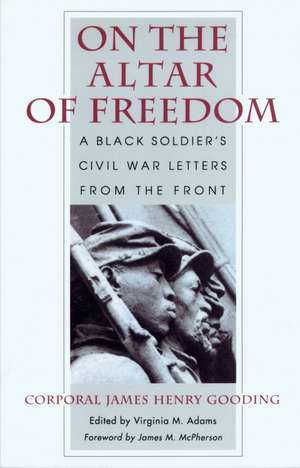On the Altar of Freedom: A Black Soldier’s Civil War Letters from the Front
Autor James Henry Gooding Editat de Virginia M. Adams Cuvânt înainte de James M. McPhersonen Limba Engleză Paperback – 6 apr 1999
On February 14, 1863, twenty-six-year-old seaman James Henry Gooding volunteered to serve in the Massachusetts 54th, the first regiment of black soldiers ever recruited for the Union army. Over the next twelve months, he posted a series of remarkable letters from the front to his hometown newspaper, the staunchly abolitionist New Bedford Mercury. Written with insight and literary flair, his letters provide a vidid portrait of the war as seen through the eyes of a black volunteer.
From basic training at Camp Meigs in Readville, Massachusetts, through campaigns in Georgia, South Carolina, and Florida, Gooding faithfully records the activities of the 54th, including the legendary storming of Fort Wagner. He also voices the injustice felt by soldiers of his regiment over the issue of unequal pay, the refusal to promote deserving black enlistees to officer rank, and the deeply ingrained racism of whites in both the North and South.
Wounded and captured during the battle of Olustee, Florida, in February 1864, Gooding died later that year in Andersonville Prison.
In her introduction, Virginia M. Adams provides biographical details on Gooding's life and examines the antebellum history of New Bedford's large and articulate community of free blacks.
From basic training at Camp Meigs in Readville, Massachusetts, through campaigns in Georgia, South Carolina, and Florida, Gooding faithfully records the activities of the 54th, including the legendary storming of Fort Wagner. He also voices the injustice felt by soldiers of his regiment over the issue of unequal pay, the refusal to promote deserving black enlistees to officer rank, and the deeply ingrained racism of whites in both the North and South.
Wounded and captured during the battle of Olustee, Florida, in February 1864, Gooding died later that year in Andersonville Prison.
In her introduction, Virginia M. Adams provides biographical details on Gooding's life and examines the antebellum history of New Bedford's large and articulate community of free blacks.
Preț: 171.34 lei
Preț vechi: 197.96 lei
-13% Nou
Puncte Express: 257
Preț estimativ în valută:
32.80€ • 35.64$ • 27.57£
32.80€ • 35.64$ • 27.57£
Carte indisponibilă temporar
Doresc să fiu notificat când acest titlu va fi disponibil:
Se trimite...
Preluare comenzi: 021 569.72.76
Specificații
ISBN-13: 9781558492028
ISBN-10: 155849202X
Pagini: 198
Dimensiuni: 152 x 235 x 13 mm
Greutate: 0.32 kg
Ediția:First Edition
Editura: University of Massachusetts Press
Colecția University of Massachusetts Press
ISBN-10: 155849202X
Pagini: 198
Dimensiuni: 152 x 235 x 13 mm
Greutate: 0.32 kg
Ediția:First Edition
Editura: University of Massachusetts Press
Colecția University of Massachusetts Press
Notă biografică
Virginia M. Adams is librarian emerita of the Old Dartmouth Historical Society's Whaling Museum Library in New Bedford.
Recenzii
"Our correspondent, 'J.H.G.', is a member of Co. C., of the 54th Massachusetts regiment. He is a colored man belonging to this city, and his letters are printed by us, verbatim et literatim as we receive them. He is a truthful and intelligent correspondent, and a good soldier."—The Editors, New Bedford (Massachusetts) Mercury
"These letters are a rare find. I know of nothing else like them for black soldiers in the Civil War. They give an unparalleled picture of the activities and thoughts of a black regiment by one of its enlisted men. And best of all, these letters are about the most famous of all the black regiments, recently made even more famous by the movie Glory."—James M. McPherson
"The story of the 54th is irresistible. .... Gooding chronicles his regiment's progress from training camp through its first campaign in Georgia, the struggle for Fort Wagner in 1863 (in which half the regiment fell before the rebel guns) and the long, frustrating siege of Charleston that followed, but he is at his best arguing against the twin injustices of denying black soldiers the promotions and equal pay their bravery and sacrifice should have dictated."—New York Times Book Review
"[Gooding] was well read— allusions range from classical antiquity to Dickens—and a shrewd, witty, and opinionated observer of military life and the conduct of the war."—New Yorker
"Pithy and poignant. ..... Adams ably augments the remarkable series of letters with an insightful introduction, fact-filled annotations, and appendixes that expand our understanding of the 54th's men, their place and time, and their war. Highly recommended."—Library Journal
"This excellent work will appeal to Civil War scholars and laypersons alike."—Civil War History
"These letters are a rare find. I know of nothing else like them for black soldiers in the Civil War. They give an unparalleled picture of the activities and thoughts of a black regiment by one of its enlisted men. And best of all, these letters are about the most famous of all the black regiments, recently made even more famous by the movie Glory."—James M. McPherson
"The story of the 54th is irresistible. .... Gooding chronicles his regiment's progress from training camp through its first campaign in Georgia, the struggle for Fort Wagner in 1863 (in which half the regiment fell before the rebel guns) and the long, frustrating siege of Charleston that followed, but he is at his best arguing against the twin injustices of denying black soldiers the promotions and equal pay their bravery and sacrifice should have dictated."—New York Times Book Review
"[Gooding] was well read— allusions range from classical antiquity to Dickens—and a shrewd, witty, and opinionated observer of military life and the conduct of the war."—New Yorker
"Pithy and poignant. ..... Adams ably augments the remarkable series of letters with an insightful introduction, fact-filled annotations, and appendixes that expand our understanding of the 54th's men, their place and time, and their war. Highly recommended."—Library Journal
"This excellent work will appeal to Civil War scholars and laypersons alike."—Civil War History
